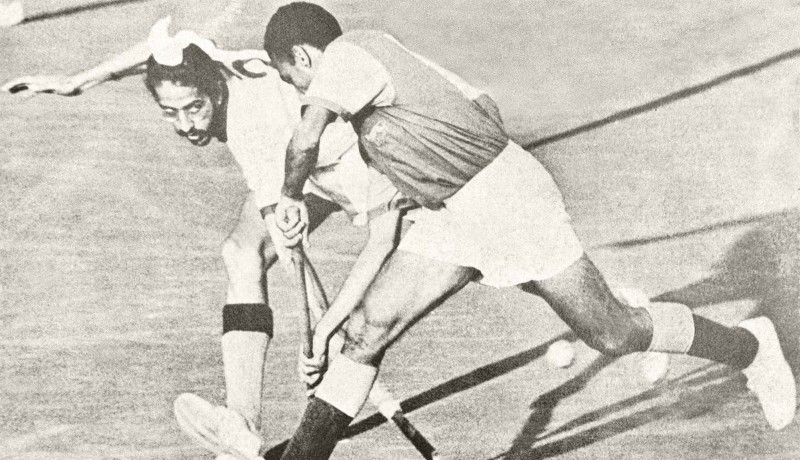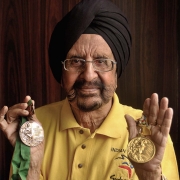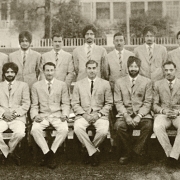
People

Former India hockey captain and Olympian Gurbux Singh walks down memory lane with Partha Mukherjee.
It’s only a few days before the 2016 Olympic Games kick off in Rio de Janeiro and there is one person we just had to visit. Age may have slowed his pace but nothing else seems to have changed for the tall, turbaned octogenarian.
Conversation flows easily for Gurbux Singh, former India hockey captain and Olympic gold medallist. Singh adjusts his spectacles gingerly but he minces no words. “Sure, I am hopeful of our hockey team’s chances. We reached the finals at the Champion’s Cup very recently, after three or four decades. We are now at No. 5 from No. 12 in the international rankings, where we had been languishing for ages. Good times are in sight.”
For a man who was a member of the Indian hockey team when it was the best in the world—with eight gold medals—Singh’s opinion on the Indian squad’s chances are not to be taken lightly. He says he is hopeful they will reach at least the quarterfinals at the Rio Olympics.
“I have been to the Olympics six times; twice as a player [in Tokyo, where the team won a gold medal in 1964, and Mexico, a team he captained jointly with Prithipal Singh that won the bronze in 1968]; once as coach in Montreal; then in Munich as the hockey correspondent of a leading Indian daily newspaper; once as a hockey commentator for national broadcaster Doordarshan; and once as an observer for the Indian Hockey Federation,” says the legendary defender, who also led the squad to gold at the Bangkok Asian Games in 1966.
Singh has been associated with the sport for almost four decades. After he retired from the game in 1968, hockey “refused to let him go”. The veteran went on to become a coach and national selector, apart from being published in the sports pages of several national publications. He also had a successful stint as commentator and continues to spend his retired years routing pensions to retired sportspersons.
Across these decades, Singh has never taken his eye off the ball and is happy to explain why Indian hockey fell from glory. In a word, he says: Astroturf. “With time, the rules of the game have changed; more significantly for us, the turf has changed,” says Singh. “Hockey is now played on a synthetic surface, Astroturf. The balls are swifter and the players’ reflexes have to keep up. While, initially, the Indian subcontinent couldn’t afford to set up these fields all over the country, Australia and European countries began to practise all year long. This became one of the major contributing factors to our decline.”
Dribbling back the years, Singh says, “Hockey is in my genes,” crediting his passion for the sport to his father Major Kartar Singh, a hockey enthusiast who set up the Army Medical Corps hockey team in Rawalpindi. “I grew up greatly influenced by my father’s passion for hockey. He recruited boys to play from Sansarpur in Jalandhar district—the cradle of Indian hockey—and adjoining Mithapur. These two villages have produced a number of hockey Olympians. He continued scouting talent even when he was posted in Lucknow,” recalls the former India captain, who was born in Peshawar, now in Pakistan.
Like many others who later went on to become hockey stars, Singh was greatly inspired by Dhyan Chand, the legendary Indian hockey captain who led his team to India’s first Olympic gold in the 1928 games in Amsterdam. “As a child, I used to visit the grounds with my father who was then playing for the Army Medical Corps. Dhyan Chand used to play for the Punjab Regiment,” he recalls.
These were times when cricket was not popular among commoners. “By 1928, India became the first non-European team to be a part of the International Hockey Federation. We had become unbeaten champions in the Olympics, garnering six gold medals in a row from 1928 to 1956!” says Singh, his eyes sparkling. “Hockey was the one sport in which India was a world leader. By the mid-50s—I was a teenager then—I had a strong inclination to pursue the sport. I was just not sure in what direction I was headed.”
The lad soon found a place in the school hockey team in Lucknow. It was the only sport at the time with an international presence. “The cricket World Cup began in 1975 and India won it in 1983—three years after the Indian hockey team won its last gold at the Moscow Olympics.”
Singh’s father was transferred to Mhow in 1953 where the 18 year-old got to play hockey with Army officers and serious hockey players. Later, he moved with his family to Gwalior, where he was selected for the Madhya Bharat team and played in the National Hockey Championships. This was when Singh got a tremendous opportunity to be coached by Roop Singh, brother of the great Dhyan Chand. And when he played for the country in the ’50s and ’60s, he had the privilege of being coached by the great Dhyan Chand himself. “He had put India on the world hockey map. Yet, as coach, his simplicity was his asset. He could connect with the players easily. I still remember his pep talk when we were on tour in Berlin; ‘Boys, we won the Olympic gold here in 1936…let’s go out there and retain our winning spree, 27 years later’.”
Singh’s career took a turn in 1956, when he was denied admission to the Indian Military Academy, Dehradun, owing to a perforated eardrum. So, he decided to join his brother-in-law’s automobile spare parts business in Kolkata. But that was never his destiny. At the time, a friend who had earlier played for East Bengal, recommended Singh to the club’s officials. “The club signed me and we went to the finals of the three major tournaments in Calcutta,” he recalls.
After that, there was no looking back. The 21 year-old’s stick-work caught the attention of the national selectors and he soon found a place in the Bengal squad and headed for the National Hockey Championships again, in 1957.
Five years later, Singh was on a flight to Tokyo for the Olympics. He recalls, “I had never seen a flyover before… can you imagine, arriving at the Olympic village straight from the airport without once touching the road!” He shares another precious memory from that trip. “We had brought a few Indian cooks with us and our food was relished by players from other countries, and they would gather around our tents to eat.”
Singh’s tone changes as he prepares to relive his moment of glory. In the final match at the Tokyo Olympics, India faced Pakistan, a day he has never forgotten. “It was a high-strung match as Pakistan had beaten us at the Jakarta Asian Games in 1962. Tension ran so high that our team manager Mohan Mahajan went off the field as he couldn’t bear to watch. Prithipal Singh emerged as the real hero in Tokyo, with his cunning stick-work that contributed largely to fetch us the victory. Mohinder Lal scored a goal in the 41st minute to give India a 1-0 lead. Though Pakistan fought back valiantly, our goalkeeper Shankar Lakshman guarded his post like a rock till the very end of play,” remembers Singh, proving that age hasn’t robbed him of his photographic memory. “After the match the Indian high commissioner threw a party in honour of the country’s 7th Olympics victory.”
Singh finally hung up his stick after the Mexico Olympics in 1968 and went on to become coach, first of the French national team and then the Indian team. “Hockey has given me everything; otherwise, a bespectacled player like me would never have reached where I am today,” says Singh, who is honorary vice-president of the Hockey Association of West Bengal.
On youngsters in India seeking a career in sports, he believes. “All sportspersons don’t come from rich families; rather, they come mainly from middle-class, even lower middleclass, families with big dreams. But how many can really make it, that too by sacrificing an education? Let’s accept the reality… our country is not the best place for a youngster to build a career in sports.”
Singh should know, considering he has gone to great lengths to arrange financial aid for sports personalities of yesteryear. Apart from his great sporting spirit, Singh is also a businessman at heart, and is the director of a company involved in automobile spares. He also spends his time visiting his children, who now live overseas. And even at the age of 80, he is invited by local publications to write columns on hockey.
Above all, Gurbux Singh is still trying to serve Indian hockey and is often spotted at the Sports Authority of India complex at Salt Lake in Kolkata, offering advice to the curator of the grounds. He smiles and says, “Hockey is like oxygen to my soul.”
Milestones
1964
Member of the gold-winning hockey team in the Tokyo Olympics
1966
Arjuna Award
1968
Co-captain of the bronze-winning hockey team in the Mexico Olympics
1976
Coached the Indian hockey team for the Montreal Olympics
2013
Conferred the Banga Bibhushan Award by the West Bengal government
Photo: Shilbhadra Datta, Gurbux Singh Featured in Harmony — Celebrate Age Magazine August 2016
you may also like to read
-
For the love of Sanskrit
During her 60s, if you had told Sushila A that she would be securing a doctorate in Sanskrit in the….
-
Style sensation
Meet Instagram star Moon Lin Cocking a snook at ageism, this nonagenarian Taiwanese woman is slaying street fashion like….
-
Beauty and her beast
Meet Instagram star Linda Rodin Most beauty and style influencers on Instagram hope to launch their beauty line someday…..
-
Cooking up a storm!
Meet Instagram star Shanthi Ramachandran In today’s web-fuelled world, you can now get recipes for your favourite dishes at….









